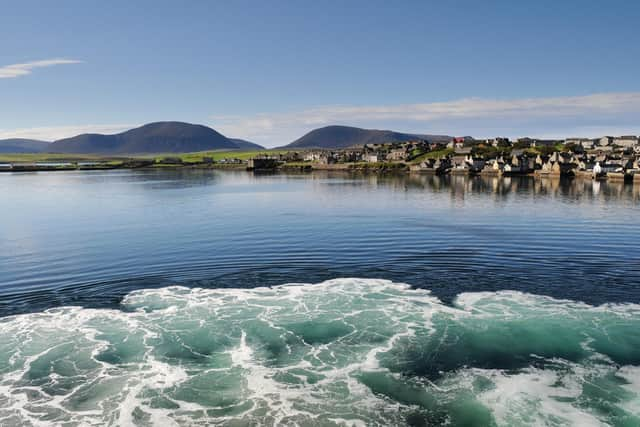Orkney and Shetland want more powers of their own, not SNP’s tired identity politics that hold us back - Alistair Carmichael
When asked in Parliament if the Northern Isles had the right to rule their own affairs, the answer from SNP MP Steven Bonnar was to the point: it was “ridiculous”, and he would not entertain it.
Independence for me – but not for thee.
It is a refrain we are all-too familiar with in the Highlands and Islands under SNP rule. Fifteen years of nationalism in Holyrood has seen local control traduced and services centralised, piece by piece.
Advertisement
Hide AdAdvertisement
Hide AdTime after time we are told that Orcadians and Shetlanders cannot be trusted to make decisions about the services and facilities that we rely upon.
We have never voted for the SNP either in Westminster or Holyrood elections and yet we are told to accept perpetual rule from the Central Belt.
People in Orkney and Shetland are pretty tired of being told by high-handed Scottish Nationalists that we are “too wee, too poor, too stupid” to run our own affairs.
Too wee? Ask our neighbours in the Faeroes about that.


Too poor? We give Scotland a massive, outsized share of oil, gas and renewable energy.
Too stupid? The Northern Isles have distinctive cultural events known around the world and drive innovation in renewables at the European Marine Energy Centre.
Our grievances about centralised Central Belt rule are precisely those thrown around with glee by the SNP about the rest of the UK – even if they do not like to hear it reflected back to themselves.
Policies made by the majority living in large, central cities are likely to work for people living in large, central cities. They are rather less likely to work for people living in rural and island communities with different needs and different priorities – and yet we are expected to accept that one-size-fits-all approach.
This is not a matter of narrow nationalism, however, but one of better governance. We are proud of our separate and distinct identity in the Northern Isles. What concerns most islanders in their day-to-day lives, however, is not dreams of a new micro-state but a durable stake in our own local affairs.
Advertisement
Hide AdAdvertisement
Hide AdOne of my greatest regrets in the way that we reached devolution in the 1990s was that we relied too heavily on identity arguments to make the case, rather than focusing on more local, accountable government. When I hear the complaint that people in Scotland should make decisions on issues that affect Scotland, I agree – I just do not believe that we have to stop there.
As long as they have been in government, the SNP have followed a similar plot: demand more powers from the UK government, while clawing away whatever powers they can from councils across Scotland. Devolution only goes as far as Holyrood.
Bute House must control what goes on across Scottish local authorities, but the people of Bute themselves are not to be trusted – nor Orkney, Shetland, Islay or any of the other island communities of Scotland.
There are many problems that are better tackled at a national or indeed a multinational level. What is too often forgotten by nationalists and other ideologues, however, is that power and accountability flows up from individuals and communities. If in doubt – keep it local.
Take marine governance, a perennial point of contention for islanders. Between the coastguard, the volunteer lifeboat missions, fisheries protection, emergency towing vessels and more, we have a plethora of services which are run at different levels and often under the thumb of administrators hundreds of miles away.
These are public services with overlapping priorities and requirements. They operate entirely differently from those in a bigger city. They cannot be treated in the same way.
Rather than hoarding power in Bute House – or indeed Whitehall – we should see this as a spur to manage these services locally, ending the silos and centralisation.
One of the saddest aspects of the nationalist debate in Scotland is that it makes us seem smaller with every repetition. We focus on artificial divisions, rather than the policies and ideals that matter.
Advertisement
Hide AdAdvertisement
Hide AdThe same actors go through the same motions, because the arguments have never improved since they were last tested in 2014.
That is because the only argument that truly matters to the nationalist side is this: we are one nation, and we must be separate from people in the rest of the UK.
It is an argument founded not on political principle but on a belief in distinct identity. The trouble for the SNP and other nationalists is that when you resort to identity arguments you cannot stop others from making their own. Once you start dividing people up it is hard to know where it should end.
In 2022 it is rare indeed that we find policy problems that neatly fit the boundaries of national lines, whether on our environment, our human rights or our security. Putin’s brutal war in Ukraine shouldbe a warning to those who think that cutting countries into ever-smaller units is a risk-free endeavour.
Of course it does not make sense for Orkney or Shetland to leave Scotland, any more than it makes sense for Scotland to separate from the UK. Adding new borders and dividing people up is the politics of the past, not the future.
What could be a real solution for the future is a true devolution of powers. Make local communities the starting point for the decisions that matter to them.
Let us leave behind the false choice of centralisation in a Holyrood or Whitehall flavour. If we can set aside the old, binary debates over identity then a new and more productive discussion can emerge.
Alistair Carmichael is the Liberal Democrat MP for Orkney and Shetland -